PROLOGUE
SETTING THE
AWFUL SCENE
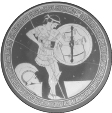
From Imagination to the Blank Page. A difficult crossing, the waters dangerous. At first sight the distance seems small, yet what a long voyage it is, and how injurious sometimes for the ships that undertake it.
C. P. Cavafy ‘The Ships’, prose poem 1895/6, trans. Edmund Keeley
EDWARD GIBBON described the process he chronicled in his Decline and Fall of the Roman Empire (1776–88) as an ‘awful revolution’. He meant by that a radical process that changed the course of human history in such a way and to so great a degree as to inspire awe. The Graeco-Persian Wars of 480–479 BCE, preceded by the Battle of Marathon in 490, occupied a much shorter timespan. Yet with the historian’s inestimable benefit of hindsight they can be seen to constitute precisely such a shock- and awe-inspiring juncture in the affairs of mankind.
The Battle of Thermopylae was a cardinal component of those Graeco-Persian Wars. In late August 480 BCE a smallish Greek force of some seven thousand or so commanded by King Leonidas of Sparta and headed by an elite force of specially picked Spartan champions stood up to a vast imperial Persian army of invasion under the supreme and personal command of Xerxes, Great King of Persia. The manner of the Greeks’ and especially the Spartans’ (de)feat was absolutely crucial at the time, in that it provided the relatively very few ‘loyalist’ Greeks (as I shall call them) with the will and the example to continue to resist, and to go on, eventually, to throw the invaders back and out of Greece and the Aegean islands. Since then, Thermopylae has been a key ingredient in the Spartan myth, or legend. It has resonated indeed throughout the entire Western cultural tradition as a deed emblematic of the peculiar Greek and Spartan qualities of reasoned devotion to, and self-sacrifice in the name of, a higher collective cause, Freedom – or rather, a variety of definitions of Freedom.
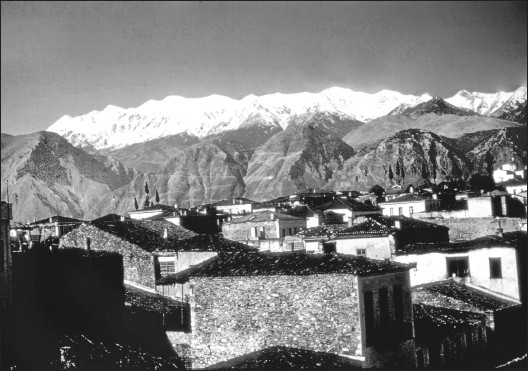
Mount Taygetus (summit: 2404 metres) towers over Sparta, casting it into shadow long before sunset, and dividing Laconia massively from Messenia. In the background to the right, late Byzantine Mistra (founded mid-thirteenth century) perches on a foothill of the Taygetus range.
But why, it may well be asked, in a book close to the heart of what Edgar Allan Poe called ‘the Glory that was Greece’, do we have to have a focus on war? There are two main reasons. War was and is the ultimately awful negative experience, humans killing other humans, often for the least altruistically admirable reasons and with the most atrocious brutality. The Greeks practised it with single-mindedness and gusto, to such an extent that it became a defining quality of their culture as a whole. To overlook the role of war in ancient Greece would therefore be to commit the historiographical sin of whitewashing the past. On the other hand, war also is or can be uniquely ennobling – giving expression to patriotic and comradely solidarity, including selfless self-sacrifice in such obviously ‘good’ causes as freedom, democracy and other lofty ideals. The Greeks were second to none in embracing that contradictory combination of the ghastly and the ennobling, which takes us straight back to the fount and origin of Western culture and ‘civilization’ – to Homer’s Iliad, the first masterpiece of all Western literature; to Aeschylus’s Persians, the first surviving masterpiece of Western drama; to the coruscating war epigrams of Simonides and, last but most relevantly of all, to Herodotus’s Histories, the first masterpiece of Western historiography.
One of the most appalling of human creations, war has given rise to some of humanity’s most sublime and influential literary creations. And not only literary: also to stunningly soaring visual monuments. Go to Delphi today – even the skeletal, ruined Delphi we perforce see, despite the best efforts of French and Greek excavators and conservators – and you will gain enough of an idea of the once astonishing superabundance of memorial building and sculpture. More precisely, of war memorial sculptures and buildings, structures such as the Treasury of the Athenians set at a visually striking angle of the Sacred Way. Or go to the Athenian Acropolis, and consider only the Parthenon: this uniquely beautiful and powerful temple was built in part from war booty and from the surplus of tribute from an Athenian-dominated anti-Persian military alliance, and it was built essentially as a war memorial. Truly, as Sophocles’s Chorus put it in his tragic drama Antigone, ‘awesome are the works of man’ – for both good and evil. Or, as the Theban praise-singer Pindar, a contemporary of the Graeco-Persian Wars, sagely put it, ‘War is sweet to those who have no experience of it. But the experienced man trembles exceedingly in his heart at its approach.’1
We in the Western world of the twentieth and twenty-first centuries, the centuries of total war, of the Flanders killing fields, of Stalingrad and Hiroshima, are surely well placed to appreciate this cardinal feature of ancient Greek culture, and in particular of fifth-century Spartan culture. Yet in another sense most of us are not in fact well placed at all. The summer of 2005, as I write, marks the sixtieth anniversary of the end of the Second World War, but that intervening period of three score years is one characterized by the total absence of a major international military conflict in either Europe or North America. Of course, there have been any number of serious wars: the Cold War, the Korean and Vietnam Wars, the Gulf War, the Iraq War, and the vicious civil wars in Bosnia and in Chechnya and in Rwanda, not to mention paramilitary terrorist atrocities in New York, Madrid, London, Omagh and elsewhere. But Americans and Western Europeans born in the years immediately after the Second World War have never – thank heavens – actually had to take up arms against a sea of foreign enemies and kill a fellow human being in the name of some patriotic or ideological cause. The President of the USA is also Commander-in-Chief of the US armed forces, but William Jefferson Clinton, notoriously, had not even undergone national service, let alone fought in the front line. It is said that during the US ‘peacekeeping’ operation in Somalia he was particularly shocked by the sight of the corpse of a US Ranger sergeant being dragged through the streets by a chanting mob. Listeners to Homer’s Iliad in fifth-century BCE Sparta or Athens would presumably have felt quite differently, inured as they were to (all too) many similar sights, in ways that we just cannot begin to imagine, let alone empathize with.
Not, let me be clear, that the ancient Greeks thought war was in itself without qualification a Good Thing. On the contrary. Eirene, the goddess representing Peace, was a part of their common Greek mythology – a senior member of the pantheon from as early as the Boeotian poet Hesiod’s authoritative verse genealogy of all the salient gods and goddesses, the Theogony (about 700 BCE). In 421 Aristophanes staged a comic play at Athens called Peace, named after the goddess; and it is made quite clear in the surviving text that it is only the arms manufacturers and dealers who make an unalloyedly positive ‘killing’ out of war. Some fifty years later, the Athenians officially instituted a religious festival of peace and commissioned from the father of the famous sculptor Praxiteles a moving statue group of the goddess cradling in her arms the infant Ploutos (Wealth, the title of another surviving play by Aristophanes, also named after the relevant deity, first performed in the early 380s).
So the Greeks in some sense valued and earnestly desired peace. Yet, despite these utopian yearnings, the harsh reality was that war was absolutely central to the Greeks’ lifestyle and world view. The sacred ‘Olympic truce’, for example, which was declared by the state of Elis every four years (the span of an Olympiad), was technically an ‘armistice’, in other words a severely practical necessity in order to enable competitors and spectators to attend the Olympic Games in safety. It was not in any sense a pacifistic manifesto. A real, non-mythical world without war, in short, was for the ancient Greeks almost literally unthinkable. On the contrary: war was found by them to be exceptionally good for thinking with.
This is the second reason why any approach to the ‘Glory that was Greece’ cannot avoid taking the military route. For example, war was for the Greeks a crucial way of defining what they took to be the essential, unalterable difference between men and women. The Greek word for ‘courage’ or ‘bravery’, andreia, meant literally ‘manliness’, signifying that war was exclusively the business of men, because only men are by their essential nature brave, or brave in the right way. Only they, that is, can show the sort of courage required by war, ‘the teacher of violence’ (or ‘harsh teacher’), as it is unflinchingly called by Thucydides, the great Athenian historian and not so great general of the Athenian–Spartan War of 431–404. You might be forgiven for thinking that that conflict must surely have been the war to end all wars – but very much not so, in harsh fact.
War, too, served, by extension, to define the citizenship of a Greek city: a Spartan or Athenian citizen in the full sense was by definition a warrior, a man of war. Women, excluded a priori by their ‘nature’, need not apply (though they were allowed to perform certain public citizenship roles, as priestesses). One of the principal functions of the public Assembly (Ecclesia) of citizens in Sparta or Athens was to decide questions of foreign policy, for which the English phrase of the ancient Greek equivalent was ‘matters of war and peace’. On average, Athens in the fifth and fourth centuries was at war with some other state entity, Greek or non-Greek, for three years out of every four, and was never at peace for as long as a decade consecutively. Sparta lagged not all that far behind Athens’s unenviable record. And war abroad spilled over into domestic politics and politicking. Indeed, one of the most conspicuous features of civic lawcourt justice in both Sparta and Athens was the political trials of unsuccessful – or questionably successful – generals and admirals, not excluding even Spartan kings.
The other major background factor is the mighty Achaemenid Persian Empire, the fastest-growing oriental empire before Genghis Khan’s Mongol juggernaut. In the space of a generation, from its foundation about 550 BCE by Cyrus II the Great, it spread out from its Iranian heartland as far west as the Aegean and east Mediterranean seaboard (including Egypt, conquered by Cyrus’s son, Cambyses) and as far east as Afghanistan, Pakistan and part of central Asia (where Cyrus himself died, still campaigning, in 529). A rash of revolts occurred on the death of Cambyses (522–521), but these were quelled by a distant relative who ascended the throne as Darius I. Darius had to cope with a further bout of revolt (499–494), this time actually led by his Greek subjects in western Asia, but he eventually effected a smooth repression. However, his attempt at reprisal and reparation on the other side of the Aegean came to grief at the Battle of Marathon in the territory of Athens in 490. This stinging defeat set the stage for an attempted conquest on a far grander scale undertaken, in the event of Darius’s death (486), by his son and successor Xerxes (480–479).
The Greeks of the mainland were always deeply divided, both traditionally and systematically. When Herodotus at a climactic moment of his narrative invokes a definition of Greekness, the list of unifying factors that he cites signally does not include political co-operation, let alone union. Predictably, therefore, they were divided on the specific issue of how, or even whether, to resist Xerxes. Nevertheless, some few Greek cities and peoples, led by Sparta and Athens, did agree to. The members of this Hellenic League (a modern term) swore a binding religious oath at the Isthmus of Corinth, probably in autumn 481, jointly to resist a Persian invasion. Unfortunately, those sworn allies did not include the Greeks of Thessaly, the first Greeks outside his empire whom Xerxes would encounter after leaving Macedonia. Their aristocratic leaders took the path of least resistance, the one that led to Susa.
In Thessalian territory lay the first conceivable line of anti-Persian defence, the vale of Tempe between Mt Ossa and Mt Olympus. Once that had been abandoned by the coalition, the next and only feasible line of defence for the Greek loyalists was the pass of Thermopylae.
Even in this dire crisis of late summer 480, Sparta did not manage to send a full muster of its adult male citizen warriors to defend the pass, but instead dispatched only a token if elite force, commanded by one of its two kings, Leonidas. Sparta’s coalition allies, too, if for different reasons, held back from sending their full fighting complements. The reasons they all gave at the time were religious, and undoubtedly religion in ancient Greece was always a genuinely powerful historical factor. But we may reasonably suspect that another, more mundane and less creditable but entirely understandable, motive was more potently at work here – namely, panic fear: fear that the Persians simply were too multitudinous to be resisted, either at Thermopylae or, possibly, anywhere else. After all, the vast majority of the several hundreds of other mainland Greek cities had already voted with their feet and decided willy-nilly to join or at least not oppose the Persians rather than try to beat them back.
So there were no Athenians at Thermopylae (though there were many thousands with the fleet at Artemisium) or Megarians, and, more controversially, only a few Boeotians, including a mere four hundred from the Boeotians’ principal city of Thebes. Later, after Thermopylae, all the Boeotians except Thespiae (an enemy of Thebes) and Plataea (an ally of Athens) ‘medized’ – took the Persian side – so that the reputation of the Thebans especially was blackened when the Persians were eventually beaten back in 479. Apart from these, there were perhaps a thousand troops each from the two local Greek peoples most directly affected, the men of Phocis and the men of Opuntian Locris.
Against them were ranged the forces of the mighty Persian Empire. At its greatest extent, this empire encompassed some three million square kilometres of territory and a whole raft of languages, nationalities, religions and cultures including of course those of the Greeks permanently settled in what are now western Turkey and Cyprus.
The news was not always all bad. Though the Persians did levy tribute in cash and in kind, this was not generally felt to be grossly burdensome. And, like the Romans, the Persians did not govern all that much, or all that directly or obviously. They were on the whole pretty tolerant rulers, especially in matters of religion. The Empire’s founder Cyrus famously liberated the Jews from their Babylonian exile and restored them to their Levantine homeland. That restoration had of course pragmatic motives and implications, but it was not undertaken solely because Cyrus was concerned about the strategic and political significance of his Jewish subjects as a major potential source of dissidence and disruption. The Jews for their part were obviously right to hail their Persian saviour as ‘the Lord’s anointed’.
On the other hand, some of the Empire’s subjects, including Greeks as we have seen, did not consider forcible membership of an alien empire to be wholly and purely a blessing, and some of those did not merely contemplate the desirable prospect of liberation from it but actively sought to achieve that freedom by military means. Freedom too, in a variety of guises, was what was chiefly at stake in the Graeco-Persian Wars of 480–479. Persian Great King Xerxes, who was present in person at the Thermopylae and Salamis battles, is reported to have been astonished by the Spartans’ conduct. He was labouring under a number of cultural misapprehensions. It had to be explained to him patiently that the Spartans behaved as they did because they were fighting for an ideal dearer than mere life itself: the ideal of freedom. Freedom – the freedom to develop their unique and uniquely influential civilization – is indeed what the Spartans and the other Greek loyalists eventually secured by defeating the Persians in 480 and repulsing them the following year, after further heroic struggles by both land and sea.
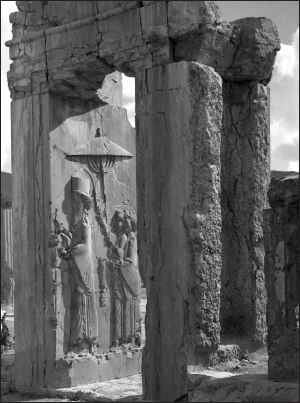
At the West Door on the North Wall of Xerxes’s Palace at Persepolis the Great King is depicted in relief, head and shoulders taller than his two attendants, one of whom carries the parasol that Greeks thought suitable only for women.
After Thermopylae (a defeat) and its linked naval battle at Artemisium (a draw) the next major encounter was the naval Battle of Salamis in late September 480, in which the Greek loyalists, led – brilliantly – by the maverick Athenian politician and general Themis tocles (though technically the Spartan Eurybiadas was still Admiral of the Fleet), won a smashing victory. Some modern as well as ancient critics, including Herodotus, have judged this to be the decisive battle of the Wars. But actually that was the land Battle of Plataea, fought in Boeotia in the summer of 479 under the overall command of Spartan regent Pausanias and won, essentially, by the magnificent Spartan hoplites. Even Plataea was not, quite, the end. But the final battle of the quartet, an amphibious engagement at Mycale on the Asiatic coast opposite the Greek island of Samos, was more the beginning of the next phase of Graeco-Persian conflict than the end of the Graeco-Persian Wars of 480–479.
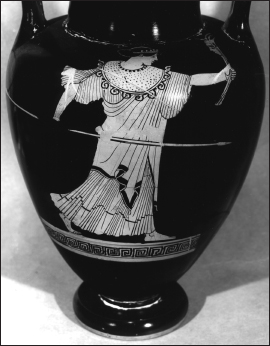
On this Athenian red-figure vase of the second quarter of the fifth century, the Athenians’ patron goddess Athena holds an aphlaston (the curved stem from a Persian warship), a trophy to commemorate and celebrate one of the several Athenian naval victories over the Persians of this period, including above all the Battle of the River Eurymedon in Pamphylia (south-west Asia Minor).
Mycale pointed forward to the formation of the Athens-based Delian League (478/7) that soon became an Athenian maritime empire and to the amphibious Battle of the River Eurymedon in Pamphylia in about 466. The Spartans, by contrast, predictably proved reluctant sailors. Formally, King Leotychidas had been in overall command at Mycale as Eurybiadas had been at Salamis, but he had had to be persuaded to abandon the safety and security of the Cyclades for a continent on which no Spartan king had yet set foot (and would not, in fact, until Agesilaus did in 396). He did not take part in the pursuit of the Persians to the Hellespont, let alone in the liberation of those Greeks in Macedonia and Thrace who were still under Persian control. Indeed, in a rather surprising anticipation of the Treaty of Lausanne (CE 1923) he proposed as a solution to the problem of the Greeks of Asia a compulsory exchange of populations: transplanting them to mainland Greece to take over the land occupied by the traitorous medizers, who should be ‘cleansed’ and forced to go to live in Asia where they spiritually belonged.
That, then, is the background of war and empire against which I am going to look again in detail at the role in 480 BCE of the Spartans, as acknowledged leaders of ‘the Greeks’ in resistance to the Persian invasion under Xerxes. I shall not disguise the brutality, the perfidy, the squalor of war – any war, all wars. But I shall also, and rather more, stress the positive outcomes of these particular Graeco-Persian wars, although they are outcomes in which the Spartans themselves for the most part chose not to be active participants. Both the rapid development of the world’s first system of truly participatory direct democracy and the creation of enduringly inspirational works of literary and visual art were mainly achievements of the Athenians or of men crucially inspired by the culture of democratic Athens. On the other hand, even these Athenian achievements are not without their dark shadow. The Athenians’ development of a maritime empire on the basis of continued resistance to Persia brought not entirely unfounded accusations of economic exploitation and brutal imperialist repression of supposedly free allies, and the famed Athenian silver that funded the fleet and so much else in the fifth century and later was extracted by the forced labour of slaves working in unimaginably torrid and often lethal conditions.
The dark side of Sparta’s full moon is perhaps even more glaringly conspicuous. The Spartans’ decision to base their entire politeia – their political and social regime and way of life – on exploitation of a native Greek underclass, the Helots, must forever tarnish their halo. So obtrusive and potentially obstructive is the ‘Helot issue’ that some modern admirers of Sparta pretend either that the Spartans’ rule over the Helots was not all that bad (if it had been, how could it have lasted for up to four centuries?) or that influential (Spartans – including two of the more prominent characters in our drama, King Leonidas and Regent Pausanias – were really all for liberating and enfranchising the Helots but unhappily were thwarted by their less farsighted and more reactionary fellow citizens). This, alas, is mere wishful thinking. Ancient admirers of Sparta, the ‘laconizers’ as they were called, were less squeamish and sentimental. They either celebrated the fact that economically speaking the Spartans were the freest of all the Greeks, thanks to the exploitation of the Helots, or claimed that the Spartan politeia was so admirable and ideally imitable that the unfreedom of the Helots was a tolerable – indeed a necessary – price to pay for it. My own considered and, I hope, balanced judgement is this: had the Spartan regime not been the way it was, warts and all, the Spartans could not have played the decisive role at Thermopylae and in other conflicts in 480–479 that they did in fact play. The Spartans thus have a paradoxically twofold or even contradictory role in the history of Western freedom both as a practice and as an idea(l).
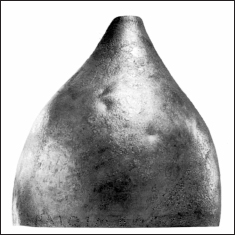
This bronze helmet of distinctive Assyrian type was worn by a Persian subject during one of the invasions of Greece, either in 490 or in 480/79; it was dedicated at Olympia as part of an official Athenian thank-offering of war-spoils with the following message inscribed upon it: ‘The Athenians, to Zeus, having taken [it] from the Medes’.
Counterfactual ‘What if?’ history is of course a pleasing distraction for historians, but it can also be a highly useful way of exploring cause and effect. What if, for example, the resistance at Thermopylae either had not happened at all, or had been much less frighteningly determined and effective than, under the leadership of Leonidas and his Spartans, it actually was? What if the Persians in 480–479 had managed to absorb the Greeks of the mainland as well as those of the Aegean islands and the western Asiatic seaboard into their far-flung empire? So many questions. There is no question, however, but that, had the Persians won, Greek civilization of the ensuing Classical era would have been immeasurably different from what did in fact evolve in the fifth and fourth centuries under the impulse of self-liberation against seemingly overwhelming military odds.
Most would argue, too, that it would have been markedly inferior. For though the Persian Empire was notably pluralist and, by ancient standards, culturally tolerant, in somewhat the same manner as the Ottoman Empire in its later stages, it is doubtful in the extreme that it could or would have tolerated the Classical Greeks’ patriotically inflected combination of democratic self-government and very particular and aggressive notions of freedom. That freedom in its turn was the condition of the cultural achievement that came to form the – or at least a crucial – basis of the Western cultural and political tradition, of which Sparta was and is a prime exemplar.